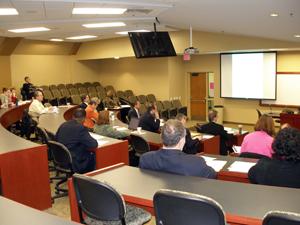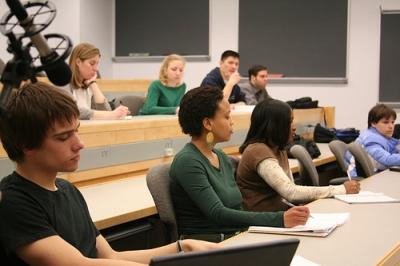Focus and intention
Posted by: Gary Ernest Davis on: January 12, 2010
One of the reasons I talk a lot less in class than I used to is because, in my experience, my students do not have good listening skills.
The main reason I talk less is because I am listening more – listening to student concerns, watching for the creased brow, the frown, as another student explains an answer; listening for the hesitancy as a student asks a question; watching for signs that student attention has wandered.
 Sometimes student attention wanders so badly that even after I have projected the course Web page onto the class overhead projector, got all students to log into that site on their computers (one computer to two students) and carefully talked through the details on a Web page, I will still get a student asking something like : “When is the first test?” – a matter we dealt with at length only 2 minutes ago!
Sometimes student attention wanders so badly that even after I have projected the course Web page onto the class overhead projector, got all students to log into that site on their computers (one computer to two students) and carefully talked through the details on a Web page, I will still get a student asking something like : “When is the first test?” – a matter we dealt with at length only 2 minutes ago!
x
x
As adults we all know that our attention is not always with a speaker. We attend conferences, staff meetings, and a myriad other meetings and workshops and to be honest, our attention is not always where it should be from the get-go. Â Why is that? Are we just grown up fidgets? Do we have actual or residual ADD? Â Possibly. But the most common reason is one of intention: we never actually intended to listen fully. And the reason for that is because often at meetings we are simply attending – just being there because we ought to or have to, not because we intended to come to listen and learn.

There is, very roughly, a chain of dependency in our recall of an event: memory depends on attention which depends on intention.
Without intention there is unlikely to be attention, and without attention there is unlikely to be long term memory. A lot of our lives, particularly in larger social settings, we go through life as if asleep, attending, being there and chatting, but not intending to pay attention.
How much harder is it for students in school who are expected to pay attention for the greater part of the school day? Really, how hard is that? To be almost constantly paying attention to every word that every teacher says, to every task that is assigned? Â It is nigh on impossible isn’t it?
We all need a break after 20 minutes or so of complete attention to a task. How many middle school high school, college teachers get their students to get about, walk around, chat for 5 minutes, before getting back to another extended period of paying attention, with intent to learn?
What happens instead, is that class times in middle school , high school and college, become increasingly long periods of students suffering teacher talk, or tasks they do not comprehend or the point of which they do not understand  (like multiplying binomials). It can take an effort of iron will to force oneself to intend to learn, to intend to pay attention completely, and to do this class in, class out; day in, day out; week in week out; semester in, semester out; year in year out; decade in decade out. 
As a university professor I notice the fresh eager faces in class at the beginning of each semester. And I notice, every semester, despite my best efforts to keep things light and enjoyable, how those faces become bored and tired as mid-semester approaches. Â I see so many students attending because they have to, sitting in class not paying attention because they never intended to come to class to learn.
There is an interesting passage in The Go-Giver where the mentor Pindar, is talking to Joe at their first meeting, and he explains: “You get what you expect. … What you focus on is what you get.” To focus on something we have either to be shocked, or surprised, or else we have to intend to focus in it. Intentions really matter.
Spring semester 2010 I would love to ask students each morning what is their intention this hour. But with 32 + students in a class that would take a lot of time and would not really impact those who already did not have an intention to learn because they wouldn’t yet be paying attention to me.
My intent is to have a shocking or surprising things each class. For example in differential equations I will tell them that solving differential equations is trivial, and give them some simple variables separable equations to solve exactly. This, I think, will shock them, because they’ve all heard that differential equations are hard.
 This might be enough to get them to pay attention for an hour. Each class  I will have to come up with something newly shocking. Can I do it? Maybe not. But maybe I can do it often enough that I can begin to address the reasons they are in class – their intention as human beings, and as students.
This might be enough to get them to pay attention for an hour. Each class  I will have to come up with something newly shocking. Can I do it? Maybe not. But maybe I can do it often enough that I can begin to address the reasons they are in class – their intention as human beings, and as students.
I think a role I have as a teacher is to help my students be very clear about their intentions in class, and very clear when they are, and are not paying attention, and why it is that their attention has wandered, and what they can do to get it back, such as take a bathroom break, get something to eat , or walk around – Â anything but engage other students in off-task chit-chat.
Teaching mathematics 2.0: Doing more with less
Posted by: Gary Ernest Davis on: January 11, 2010
A few semesters ago I began to teach differential equations to sophomore undergraduates through extended projects, using  professional grade tools – MATLAB, Maple and Mathematica – that scientists and engineers use in their practice.
An older student in the class was a technician at a nationally known engineering company. He was re-training to be an engineer. I asked him if he had set homework to do in his job. He replied “No”. I asked if he had tests, quizzes or exams to do as part of his job. Again he replied “No”. Â I then asked if he ever had to do projects. “All the time”, was the answer. So I asked if he was assessed on those projects. He replied that he had to give a verbal and written report to his line manger at the conclusion of a project. I asked what would happen if the project was unsatisfactory, or if he did not complete it on time, or at all. He replied that if that happened a few times he could be fired.
I focus more now on numerical solutions of differential equations because, in scientific and engineering practice, that is what professionals will most likely do. I want students to work on realistic problems, using realistic methods and realistic tools. I want all mathematics written in LaTeX on WordPress blogs. I want them to write coherent accounts of their projects, and be able to present their work to the class.
I’ve had a few semesters doing this now and Spring 2010 I want to change tack a little, maybe ramp it up a notch. This semester I want to find genuine applied  problems that  students can work on, in class, in groups in a studio environment.
The reaction to projects has been overall fairly good. I estimate about 10% of students will complain that this is not how they are used to learning. Â The other 90% seem very satisfied with the project approach.
Where I am heading can be seen best in the following video of John Seely Brown. I did not get the project idea from him, but I did get the idea for studio work from him. I like this idea a lot, and I’m hoping my students do too in Spring 2010:
A number of questions are uppermost in my mind as I prepare for Spring 2010:
1. Will the students remember  anything of what they learn in the semester?
2. Will students develop flexible knowledge, that they can apply in novel settings, similar to what they worked on in semester, but sufficiently different to really test their understanding and recall?
3. Will the experience transform them? Will they gain new ways of looking at modeling situations and be capable of drawing analytical conclusions from exact or numerical solutions of differential equations?
Perhaps to the annoyance of the students I will focus each class on the transformative nature of the class experience. I want the students to understand deeply John Seely Brown’s words:
“We participate, therefore we come into being.”
I want them to do this by forming their own study groups, by using all the technological aids available to them. I want them to get excited about their projects, and to communicate what they find to other students and faculty.
I intend to have a mid-semester poster session where one and all will be invited into the class as students explain their poster presentations, and I intend to do this again at the end of semester.
I cannot, any longer, follow a text book – probably written by a self-appointed expert – set exercises for students to do, and set tests and become bitterly disappointed at the results. I’ve done that sort of crap too long. It’s not teaching, no matter how well done.
Vote on whether you think homeworks, Â quizzes, tests, exams or projects are helpful in mathematics teaching.
John Seely Brown is right – a teacher is a mentor, not an instructor.
